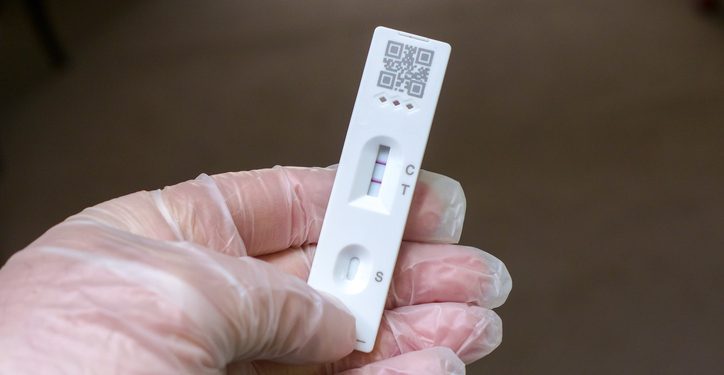Children born to mothers infected with COVID-19 while pregnant face an elevated risk of autism, along with other developmental disorders including speech and motor delays, according to a study released Thursday.
Researchers from Massachusetts General Hospital analyzed more than 18,000 births to people who delivered between March 1, 2020, and May 31, 2021, and had a laboratory-confirmed COVID-19 positive test.
Many of the women had not received vaccinations, researchers said, as the study looked at the period before COVID-19 vaccines were widely available.
According to the researchers, having a COVID-19 infection during pregnancy was associated with 29 percent higher odds of a neurodevelopmental condition in children, after adjusting for other risk factors.
Among 861 women who had tested positive for the coronavirus during pregnancy, 140 — just more than 16 percent — gave birth to a child who would receive a neurodevelopment diagnosis by the age of 3 years.
Less than 10 percent of the remaining children from COVID-negative pregnancies received such a diagnosis, the study found.
The investigators found that boys were at higher risk than girls, and in cases where the mother had a COVID-19 infection during the third trimester. Reducing the risk was important, but the overall risk of a developmental disorder diagnosis was extremely low, the authors said.
“These findings highlight that COVID-19, like many other infections in pregnancy, may pose risks not only to the mother, but to fetal brain development,” said senior author Andrea Edlow, a maternal-fetal medicine specialist in the department of obstetrics and gynecology at Mass General Brigham, in a statement.
“They also support the importance of trying to prevent COVID-19 infection in pregnancy and are particularly relevant when public trust in vaccines—including the COVID-19 vaccine—is being eroded,” Edlow said.
Earlier this year, Health and Human Services Secretary Robert F. Kennedy Jr., a longtime vaccine skeptic, announced the COVID-19 vaccine would no longer be recommended for healthy pregnant women.
Kennedy has a history of comments linking autism and vaccines, despite strong evidence showing there is no association.
The coronavirus has killed more than 1 million people in the past five years, and annual shots have served as a dose of protection. Yet fewer people have been getting them, and top administration officials have argued there’s no benefit and even potential harm to individuals.
Federal vaccine advisors now say all Americans regardless of risk factors should consult a medical provider about getting a coronavirus vaccine.
Earlier this year, Kennedy and the Department of Health and Human Services launched an effort to determine “what has caused the autism epidemic.”
In September, President Trump held a press conference in the White House flanked by Kennedy and other federal health leaders and said that use of Tylenol during pregnancy is linked to a “very increased risk” of autism. They warned mothers not to take Tylenol and said the Food and Drug Administration would put a warning label on the drug.
“Parental awareness of the potential for adverse child neurodevelopmental outcomes after COVID-19 in pregnancy is key. By understanding the risks, parents can appropriately advocate for their children to have proper evaluation and support,” Lydia Shook, a maternal-fetal medicine specialist at Massachusetts General Hospital and lead author of the study, said in a statement.















